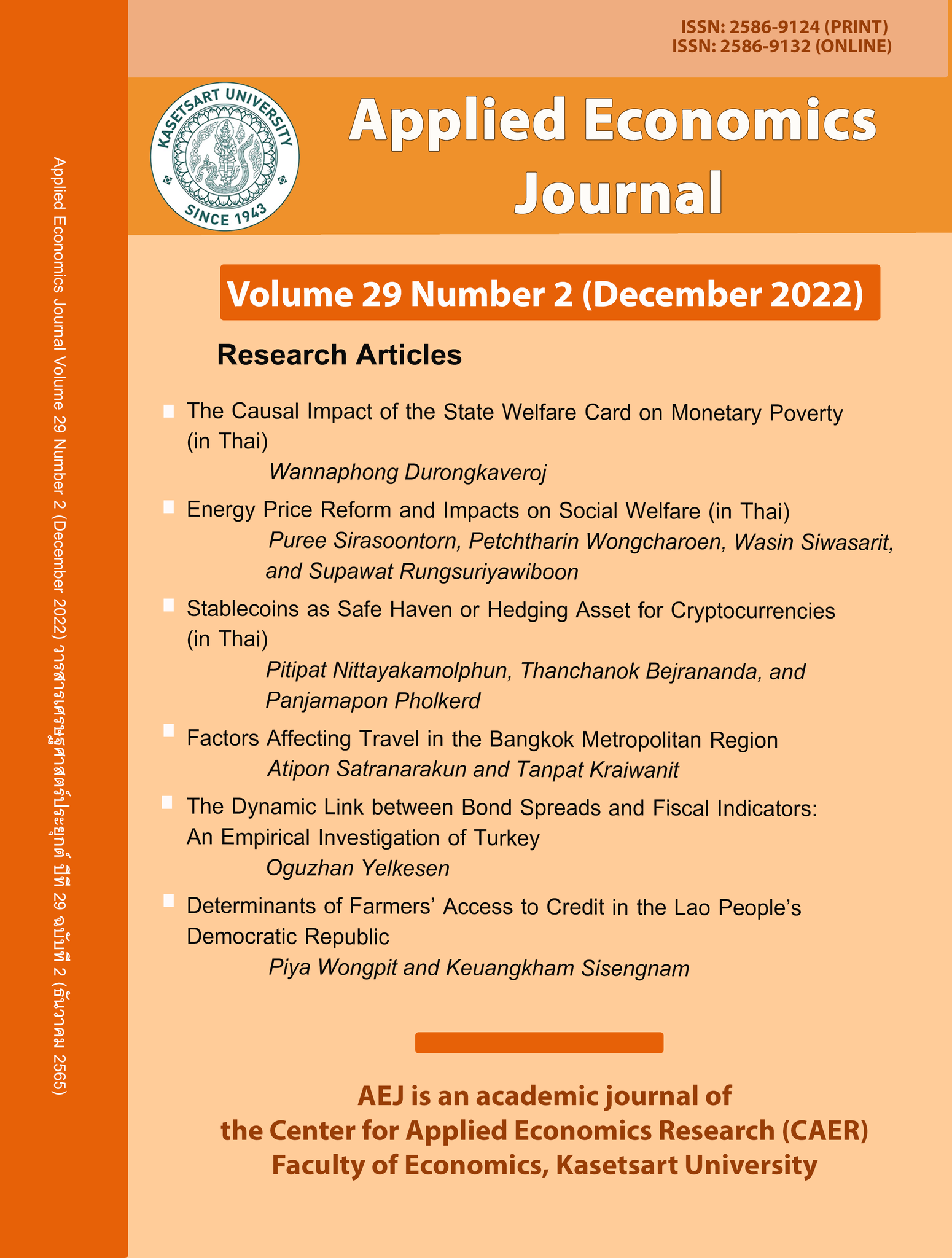Energy Price Reform and Impacts on Social Welfare
Main Article Content
Abstract
This paper studies the cost structures of different types of diesels, considering both their private and external costs, to determine which are efficient. Partial equilibrium analysis is employed to analyze the impact on social welfare if the price structures are adjusted to be more efficient. The results show that the current price structure is inefficient and distorted. The current refinery prices do not reflect the private costs for all types of diesels. Today, marketing margins are used as a policy tool to incentivize gas stations to distribute and sell more high-speed diesel (HSD) and high-speed diesel B20 (HSDB20). In addition, the current excise tax rate covers other external costs that are not directly related to fuel consumption. As a result, the actual excise tax rate is much higher than the external cost of fuel consumption. For this reason, and due to price subsidies through the oil fund, HSD and HSDB20 diesel prices are below efficient prices. Our welfare analysis reveals that restructuring diesel prices to be more efficient will increase social welfare. This can be achieved by adjusting the marketing margins to be the same rate on the basis of cost of service and modifying the excise tax to reflect the true cost of externalities associated with fuel consumption, along with a road tax reform. Furthermore, our findings demonstrate that price subsidies cannot promote social welfare even if appropriate subsidy rates are set according to the price gap approach. Reducing the role of oil funds is, therefore, necessary.
Article Details

This work is licensed under a Creative Commons Attribution-NonCommercial-NoDerivatives 4.0 International License.
The paper is published under CC BY-NC-ND, in which the article is freely downloaded and shared in its original form non-commercially and its citation details are identified.
References
Bhattacharyya, S. C. (1996). Applied general equilibrium models for energy studies: A survey. Energy Economics, 18(3), 145-164.
Bárány, A. & Grigonyte, D. (2015). Measuring fossil fuel subsidies. ECFIN Economic Brief, 40, 1-13.
Clements, B., Coady, D., Fabrizio, S., Gupta, S. & Shang, B. (2013). Energy subsidy reform: Lessons and implications. Washington, DC: International Monetary Fund.
Coady, D., Parry, I. Sears, L. & Shang, B. (2015). How large are global energy subsidies? Washington, DC: International Monetary Fund.
Davis, L. (2014). The economic cost of global fuel subsidies. American Economic Review Papers and Proceedings, 104(5), 581–85.
Deaton, A & Muellbauer, J. (1980). An almost ideal demand system. The American Economic Review, 70(3), 312-326.
Dender, K. (2019). Taxing vehicles, fuels, and road use: Opportunities for improving transport tax practice (OECD Taxation Working Papers No. 44). Organisation for Economic Cooperation and Development.
Energy policy and planning office. (2016). Reasons for using Singapore reference prices. Retrieved from: http://www.eppo.go.th/index.php/th/eppo-intranet/item/11452-faq4 (in Thai).
European Environment Agency (2019). EMEP/EEA air pollutant emission inventory guidebook 2019. European Monitoring and Evaluation Programme and European Environment Agency.
IPCC (2006). 2006 IPCC guidelines for national greenhouse gas inventories (Vol. 5). Hayama: Institute for Global Environmental Strategies.
Kansuntisukmongkol, C. (2015). Assessing the external cost of pollutants by benefit transfer (Discussion paper series No. 37). Bangkok: Faculty of Economics, Thammasat University. (in Thai)
Kijmanawat, K., Wongchavalidkul, N., Sungsomboon, P.Y., & Bakker, S. (2016). Monitoring greenhouse gas emissions in Thailand’s transport sector. Towards a measurement, reporting, and verification system for the land transport sector. Retrieved from: https://www.thai-german-cooperation.info/admin/uploads/publication/44528239550f32fe0f9cc75034674e13en.pdf
Kojima, M. (2013). Breathing clean: Considering the switch to natural gas buses (World Bank Technical Papers No. 516). Washington, DC: World Bank.
Kojima, M. & Koplow, D. (2015). Fossil fuel subsidies: approach and valuation (Policy Research Working Paper No. 7220). Washington, DC: World Bank.
Koomsup, P. (1982). Petroleum products pricing and its impacts: View from an oil-importing country; economic dimensions of ASEAN's energy security (Discussion paper series No. 86). Bangkok: Faculty of Economics, Thammasat University.
Koomsup, P, Sirasoontorn, P. & Sooksai, N. (2011). Liquefied petroleum gas pricing in Thailand: Impacts and alternatives. Thammasat Economic Journal, 29 (2), 66-165. (in Thai)
Koomsup P., Jongpeepien, T., Leelahanon, S., Sirasoontorn, P.& Sooksai, N. (2012). Fuel price restructuring in Thailand. Bangkok: Energy Policy and Planning Office, Ministry of Energy. (in Thai)
Ministry of Mines and Energy – Brazil. (2020). Fuel resale and distribution prices data. Retrieved from: http://preco.anp.gov.br/
Ministry of Petroleum and Natural Gas, Government of India (2020). About marketing. Retrieved from: http://petroleum.nic.in/marketing/about-marketing/
Samimi, R. (1995). Road transport energy demand in Australia: An integration approach. Energy Economics, 17(4), 329-339.
Sirasoontorn, P., Rungsuriyawiboon, S., Opartpunyasarn, R. & Wongcharoen, P. (2019). Economic assessment of electric vehicles adoption and energy efficiency in transport sector in Thailand. Bangkok: Electricity Generating Authority of Thailand and Thailand Research Fund. (in Thai)
Song, S. (2016). Transport emissions & social cost assessment: Methodology guide - A guide to the methodology of estimating transport emissions inventories and the associated social cost. World Resources Institute.
Tangkitvanich, S. & Kansuntisukmongkol, C. (2007). Evaluation the effect of oil price policy. Social public policy assessment with econometrics. Bangkok: Thailand Development Research Institute. (in Thai)
The Office of Transport and Traffic Policy and Planning (2016). Handbook of measurement, reporting and verification: MRV. The sustainable transport plan and increasing the efficiency of energy use in Nong Khai City. (in Thai)


